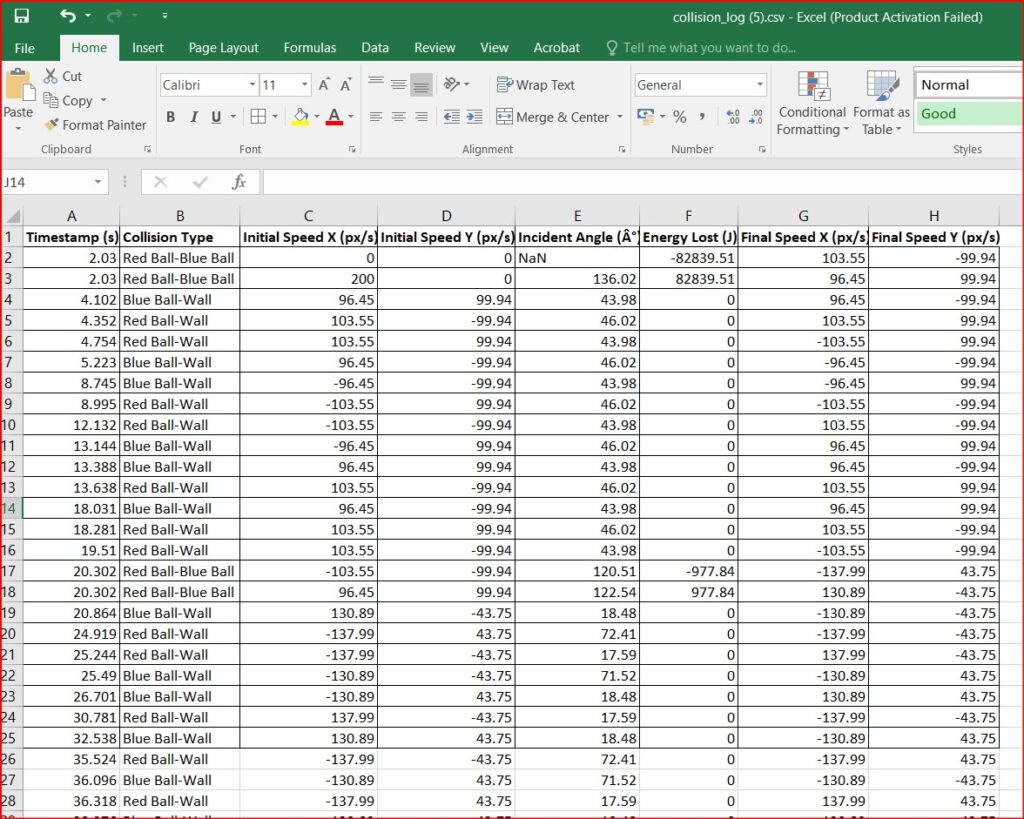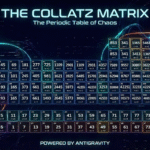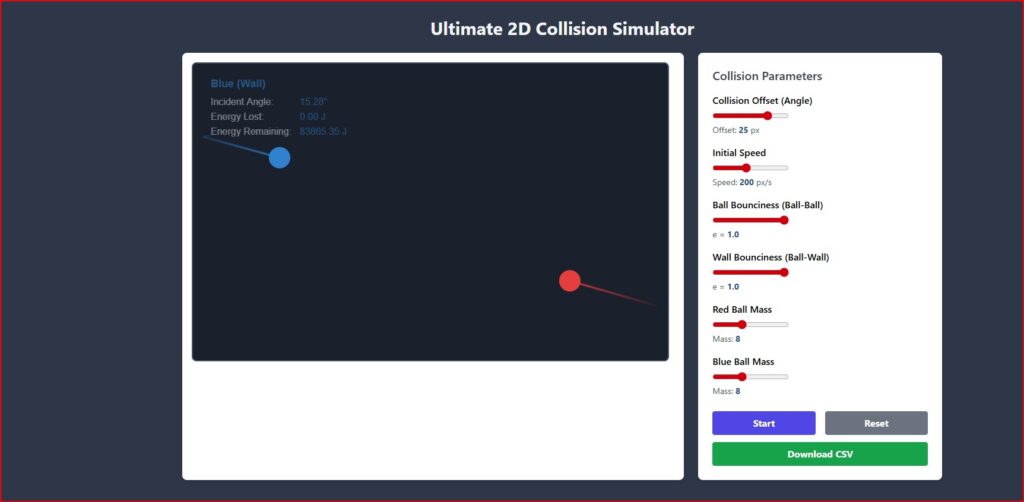From Bengaluru with love: A wild ride through code, physics, and AI collaboration ☕️✨
💡 When Your AI Friend Knows More Physics Than You Do
Here in Bengaluru, the coffee is strong and the code is stronger! ☕️ As a developer who loves a good challenge, my latest adventure was absolutely insane: building a 2D collision simulator from scratch. But here’s the twist—I had a secret weapon who was available 24/7, knew physics like a boss, and never stole my favorite debugging rubber duck! 🦆. To access this website, click here
Meet my AI sidekick, Gemini! 🤖✨
This wasn’t your typical boring coding session. Nope! This was pure “Vibe Coding” that lasted for DAYS. It felt less like programming and more like having the most epic creative brainstorm session of my life. Want to know how we brought this bouncy, chaotic digital world to life? Buckle up! 🎢
🎯 From Zero to Hero: Our Master Plan
Every legendary project needs an equally legendary plan. Building a digital universe (even a tiny bouncing one!) is serious business! Here’s how Gemini and I conquered it, step by epic step:
📝 The Dream Phase: Plotting World Domination
We started by going completely wild with ideas:
- Interactive balls that actually bounce? ✅ CHECK!
- Sliders for speed, mass, and bounciness? ✅ YOU BET!
- A way to see all the crazy physics numbers? ✅ ABSOLUTELY!
- Make it so cool that even physics teachers would be jealous? ✅ MISSION ACCEPTED!
✨ Breathing Life into Pixels: The Magic Begins
With our crazy plan ready, we jumped into HTML5 Canvas—our digital playground! 🎨 Gemini helped me sketch out the initial JavaScript Ball object, giving each ball:
- 📍 A position in our tiny universe
- 🏃♂️ Velocity (because static balls are boring!)
- 🎨 A fresh coat of digital paint
👉👈 The “Oops, They’re Touching!” Moment
Collision detection is TRICKY business! 😅 Our first attempt was like: “Hey balls, are you overlapping? Yes? Cool, bounce!”
But Gemini was like: “Hold up, we can do WAY better than that!” 🧠💪
And boy, were they right! We needed something smarter, something… LEGENDARY!
🧠 Teaching Our Digital Balls Some Real Physics
This was where the magic REALLY happened! 🪄
Me: “Hey Gemini, how do I make these balls bounce like they’re actually real?”
Gemini: drops the most beautiful physics knowledge bomb 💣📚
Boom! Suddenly I had:
- ⚡ Impulse-based collision methods
- 🔥 Core equations for momentum
- 💎 Kinetic energy calculations
- 🎓 A personal physics tutor who could also CODE!
🕹️ Giving Players the Power: Control Panel Madness
A simulation without controls is like pizza without cheese—technically possible but absolutely criminal! 🍕😱
Gemini absolutely CRUSHED it helping me build:
- 🎛️ Sliders that actually work (miracle!)
- ⚡ Lightning-fast event listeners
- 🔗 Perfect connections between UI and physics
- 🎮 The most satisfying interactive experience ever!
📈 Data Nerds, This One’s for You!
What’s a physics experiment without DATA? 📊 We went absolutely bonkers and decided to log EVERY. SINGLE. COLLISION.
Gemini helped us create the most beautiful “Download CSV” button that turns our little bouncy world into a data-gathering POWERHOUSE! 💪📈
🌠 Making It Look AMAZING: The Eye Candy Phase
Time for the good stuff—making everything look absolutely STUNNING! ✨
- 🌈 Fading trails behind balls (because trails are life!)
- 💫 Pop-up text during collisions
- 🎨 Visual effects that make everything feel ALIVE
- ✨ That special sparkle that turns code into art!
🤯 The Quest for Physics Perfection: Going Full Nerd Mode
Our early tests revealed a tiny flaw—kinetic energy wasn’t being perfectly conserved. Classic simulation problem! 😤
But did we give up? HECK NO! 💪
Gemini and I brainstormed like crazy scientists and discovered the holy grail: calculating the exact “Time of Impact”. Sure, it made our code more complex, but the physics became chef’s kiss PERFECT! 👨🍳💋
⚡ The Magic Sauce: What Makes Our Balls Bounce Like Champions
At its heart, our simulation runs on two GOLDEN rules of physics:
🎯 Conservation of Momentum: The Universe’s Accounting System
Think of it like the universe keeping perfect books! 📚⚖️
The Rule: Total momentum before collision = Total momentum after collision
Our code is like a super-strict accountant that calculates “impulse” and applies it equally and oppositely to both balls. No cheating allowed! 🚫📊
🏀 Bounciness Control: The Fun Slider!
This magical slider controls how much energy gets lost:
- Set to 1 = Perfect bouncy castle mode! 🏰
- Lower it = Real-world mode where energy turns into sound and heat 🔥🔊
It’s like having a Reality Dial for your physics! 🎛️✨
🎓 Why This Could Change Education FOREVER
I’m not kidding—this simulator could be a total GAME-CHANGER for learning! 🎯
👀 See Physics in Action: No More Boring Textbooks!
- Watch a heavy ball absolutely DEMOLISH a lighter one! 💪⚽
- See momentum transfer happen in real-time! ⚡
- Physics concepts that used to be invisible? Now they’re RIGHT THERE! 👁️🗨️
🔬 Instant Experiments: The Science Playground
- Wonder what happens with super bouncy collisions? Slide the bar and BOOM! 🎢
- Curious about zero bounciness? Try it! Watch everything go thud 🥺
- Learning becomes hands-on experiments instead of memorizing formulas! 🧪🎉
🌟 Making the Abstract Tangible
Momentum and energy used to be these scary, invisible concepts. Now they’re your DIGITAL PETS that you can see, touch, and play with! 🐾✨
My Coding Buddy is an AI: How I Built a Physics Simulator with Gemini!
Here in Bengaluru, the coffee is strong and the code is stronger! ☕️ As a developer, I love a good challenge, and my latest project was a fun one: building a 2D collision simulator from scratch. But this time, I had a secret weapon—a new coding partner who was available 24/7, knew physics like a pro, and never hogged the keyboard. Meet my AI sidekick, Gemini!
This wasn’t just about writing code; it was a “Vibe Coding” session that lasted for days. It felt less like programming and more like a creative brainstorm, and I want to share how we brought this bouncy, chaotic world to life. 🚀
From a Blank Screen to Bouncing Balls: Our Game Plan
Every great project needs a plan, and building a digital universe (even a small one!) is no exception. Here’s how Gemini and I tackled it, step-by-step:
- The Blueprint 📝: We started by dreaming up the features. Interactive balls? Check. Sliders for speed, mass, and bounciness? You bet. A way to see what the heck was actually happening with the numbers? Absolutely!
- Breathing Life into Pixels ✨: With a plan in hand, we used HTML5 Canvas to draw our world. Gemini helped sketch out the initial JavaScript
Ballobject—giving it a position, velocity, and a fresh coat of paint. - The “Oops, They’re Touching!” Moment 👉👈: Collision detection is tricky. Our first attempt was a simple check: “Are the balls overlapping?” Gemini helped refine this, but we quickly realized we needed something smarter to be truly accurate.
- Teaching the Balls Some Physics 🧠: This was the fun part! I’d ask, “Hey Gemini, how do I make these balls bounce realistically?” And boom, it would explain the impulse-based method and provide the core equations for momentum and kinetic energy. It was like having a physics tutor who could also write the code for the test!
- Handing Over the Controls 🕹️: A simulation is no fun if you can’t mess with it. We built a control panel with sliders. Gemini was great at quickly generating the HTML and the JavaScript event listeners needed to link the sliders to the simulation, making the whole thing interactive.
- Unleashing the Data! 📈: What good is a physics experiment if you can’t see the data? We decided to log every single collision. Gemini helped structure this data and create a neat “Download CSV” button, turning our little simulation into a powerful data-gathering tool.
- Adding the Sparkle & Trails 🌠: To make it look cool, we added fading trails behind the balls and on-screen text that popped up during collisions. It’s these little touches that make an application feel alive!
- The Quest for Perfect Physics 🤯: Our early tests showed a tiny flaw—kinetic energy wasn’t being perfectly conserved. It was a classic simulation problem! Brainstorming with Gemini led us to a more advanced solution: calculating the exact “Time of Impact.” This made the code more complex but the physics chef’s kiss perfect.

Figure – 3: Data in CSV Format , that can be used for further analysis
The Magic Behind the Bounce: What’s the Logic?
At its heart, the simulation runs on two golden rules of physics:
- Conservation of Momentum: Think of it as the universe balancing its books. The total momentum of the balls before they collide must equal their total momentum after. The code ensures this by calculating an “impulse” and applying it equally and oppositely to the two balls.
- Bounciness (Coefficient of Restitution): This is a simple slider that controls how much energy is lost. Set it to
1, and you get a perfectly elastic collision, just like in a physics textbook. Lower it, and the balls lose energy, mimicking real-world collisions where energy turns into sound or heat.
A Game-Changer for Students 🎓
I truly believe this simulator could be a game-changer for learning. Forget staring at equations on a whiteboard! With this tool, students can:
- See Physics in Action: Actually watch how a heavier ball affects a lighter one.
- Experiment Instantly: What happens if you make a collision super bouncy? Or not at all? Slide the bar and find out! It turns learning into a hands-on experiment.
- Visualize the Invisible: Concepts like momentum and energy are abstract. This tool makes them tangible and intuitive.
Become a Data Detective 🕵️♀️
That “Download CSV” button is where the real magic happens for data nerds. Hitting that button gives you a detailed log of every single bounce. You can open this in any spreadsheet software and become a data detective!
- Verify the Laws of Physics: Add up the momentum columns before and after a collision. You’ll see for yourself that it’s conserved!
- Run Experiments: See how changing the mass affects the energy lost. Plot the angle of incidence vs. the angle of reflection. You can do real, quantitative analysis.
- Find Patterns: What happens in a multi-ball pile-up? The data holds the secrets.
Each row in the CSV is a story, telling you the ball’s velocity before the crash, the angle of impact, the energy it lost, and its new velocity as it flies away.

🕵️♀️ Become a Data Detective: CSV Magic Time!
That “Download CSV” button? That’s where the REAL MAGIC happens for all you data nerds out there! 📊🔍
Hit that button and get:
- 📝 Detailed log of EVERY bounce
- 📈 Spreadsheet-ready data for analysis
- 🕵️♀️ Your ticket to becoming a PHYSICS DETECTIVE!
🔬 What Can You Discover?
- Verify physics laws yourself! Add up momentum columns—watch conservation in action! ⚖️
- Run crazy experiments! See how mass affects energy loss! 🏋️♀️
- Find secret patterns! What happens in multi-ball chaos? The data knows! 🌪️
- Plot amazing graphs! Angle of incidence vs angle of reflection—pure math poetry! 📐✨
Each CSV row is a STORY—telling you the ball’s velocity before the crash, impact angle, energy lost, and its new velocity as it flies away into digital freedom! 🦅📊
Final Thoughts from My Bengaluru Desk
This project was more than just a technical exercise; it was a glimpse into the future of development. Working alongside an AI like Gemini made the process faster, more accurate, and honestly, a lot more fun. It handled the boilerplate, helped debug the tricky physics, and allowed me to focus on the creative and educational aspects. It’s an exciting time to be a developer, and I can’t wait to see what my AI coding buddy and I will build next!











